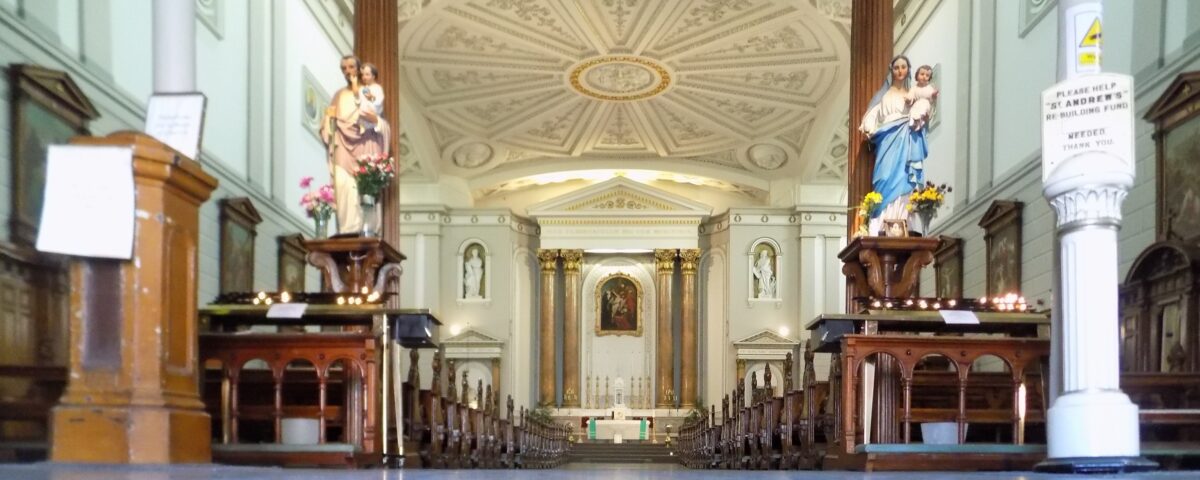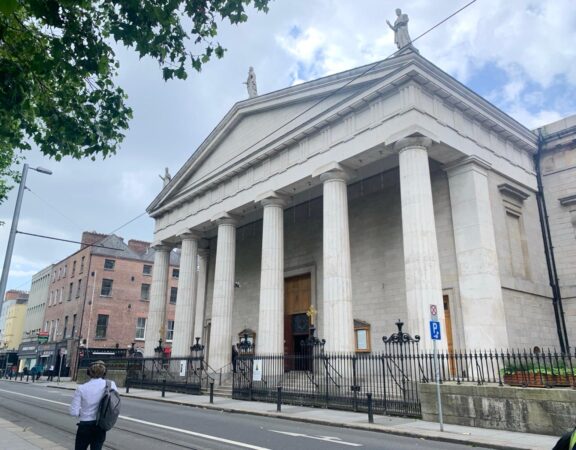First Sunday of Advent 2023
Homily of Archbishop Dermot Farrell
St Andrew’s Church, Westland Row, Dublin
Today’s readings summon us to wait in joyful hope for Christ’s [second] coming, and to be vigilant and alert, for God may touch our lives in surprising ways. This summons is a big challenge, especially during the weeks before Christmas, in which waiting suggests endless traffic jams or waiting in line to pay for the special gift. The waiting is scarcely the vigilance in hope and expectation the Gospel calls for. The call of the Lord to “stay awake for we do not know the hour” should not be heard as a threat or warning, but as an invitation to watchfulness, alive to the possibilities of each day. We are asked in Advent not to simply endure the waiting, the frustrations, the difficulties. Instead, we are asked to live with and into all the possibilities the difficulties open up: “This very moment, with all its imperfection and frustration, because of its imperfection and frustration, is pregnant with possibilities, pregnant with the future, pregnant with Christ.” (Advent and Christmas – Michelle Francl-Donnay, pp 32-33).
Jesus himself set ‘being vigilant’ and ‘praying’ side by side (Matt 26:41; Mark 13:33). If we want Advent to transform us—our hearts and our country—there is one thing and only one thing that will change and renew us—the coming of God in our lives. For when God becomes present to us in prayer though interior alertness and watchfulness, our lives are changed and transformed. When God turns his face to us, we turn our heart to God and to each other.
Each one of us is reminded that life itself is fragile and finite. The great gift of time is given to us so that our lives may express our true identity as daughters and sons of God. Our Christian life is grounded in the belief that God is at work in our world and in our lives “guiding those who act with integrity and keep his ways in mind.” (Isa 64:4) Growing in faith is about opening our heart to recognise God’s presence. Let us then be awake and watchful to encounter the Lord in each passing day.
The call to watchfulness applies just as much to our lives together as a community. We have witnessed on our streets and around the world just how easily differences can be transformed into suspicion, suspicion turned to hatred and hatred to violence. Christians believe that Jesus Christ is the Way, the Truth and the Life; that only Truth will set us free; and that the Way of Jesus is one of encounter and accompaniment, of inclusion and reconciliation. In Jesus there is neither Jew nor Greek, slave nor free, male nor female (see Gal 3:28). We have been awakened by recent events to recognise that there are malign forces at work that exploit anxieties to foment hatred. In this watchful season of Advent let us be alert to challenge the hurtful and hateful language and behaviour that fuels a climate of intimidation and fear.
Communities that are grounded in solidarity and a sense of fairness are the best defence against the corrosive influence of those who seek to foster division and violence. Strong communities are built on trust and foster trust. They express their values by supporting each other. They are sufficiently confident in their identity to welcome newcomers. We are fortunate that there are so many communities that demonstrate these characteristics. Indeed, every parish community is called to live these values since they are signs of the Kingdom of God, where the weak and vulnerable have a prior claim. At the end of every celebration of the Eucharist we are asked “to go in peace, to glorify the Lord with our lives.” The Lord is glorified wherever His Kingdom is proclaimed in deeds as well as in words.
In that context I am pleased to celebrate your patron’s Feast Day with the parish community of St Andrew. This historic parish has always recognised a mission to serve the wider community as well as local residents. The doors of this church are open every day to receive the weary and the troubled, and all those who come to pray or light a candle in moments of peace and recollection in God’s House. May St Andrew’s always be church of care for the broken hearted, a church of mercy for the faltering step, and a church that mirrors God’s love for his people.
That spirit of openness and welcome has embraced the Lithuanian and Chinese communities who now form such an important part of this parish. The distinct cultural and liturgical traditions present here have created a powerful opportunity for encounter and growth at the heart of our City.
It is appropriate today also to highlight and give thanks for the service and witness of St Andrew’s Resource Centre which this year celebrates the fiftieth anniversary of its foundation as the Social Service Centre. This was a parish initiative and I congratulate Fr Tom O’Keefe and the other visionary leaders who established and guided this practical expression of Christian solidarity and service. As it has grown and developed over the years into a remarkable institution with a widely admired record of innovation and achievement, it has remained faithful to the founding vision and kept its roots in the parishes of Westland Row and City Quay. I look forward to seeing the Centre’s latest initiative when I present certificates next week to graduates from its Construction Skills Programme, connecting young people with opportunities in the city economy.
An anniversary like this golden jubilee provides an opportunity to reflect on the journey thus far, but its value is greatest when it inspires renewed energy and commitment for the journey ahead. I pray that this will be the fruit of this celebration.
For all of these reasons, like St Paul in our second reading, “I thank God that you have been enriched in so many ways” (1 Cor 1:4). I know that the spirit of service remains strong. As you know, you may be asked to develop that service further as one of the two pillars of a new approach to mission and outreach by our diocese to the changing city of Dublin. What that may entail has yet to be fully discerned, but I am confident that as in the past this parish community “will not be without any of the gifts of the Spirit” (1 Cor 1:7).
In these Advent days we look for the signs of where and how God moves in the common occurrences of every day. This is the human face of God whose Kingdom “is present wherever he is loved and wherever his love reaches us” (Pope Benedict XVI, Spe salvi, 31). This is the God who offers a hope we cannot attain by ourselves. Being attentive to this day-by-day coming of God, we become, like Jesus, bearers of hope for those who find themselves wandering in the desert of disappointment, discouragement, and disillusion. Being on the lookout for this day-by-day coming of God, that is having a fruitful Advent. In these days of Advent may we never cease to pray that his Kingdom may come, that justice and mercy be done. Come, Lord Jesus! Maranatha! Do not delay.
+Dermot Farrell
Archbishop of Dublin







